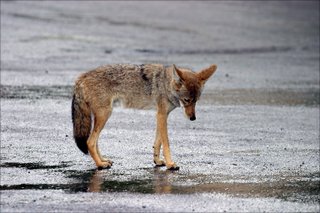2006: The Year In Review
 Since it is now the 4th day of February, it might seem a bit silly to write my year in review in the manner I did last year (see Jan. 4, 2006 entry). I credit to the delay to being both ill and busy - twin complaints which conspired to prevent me adequate time for life reflection. That and as we all know, I'm lazy.
Since it is now the 4th day of February, it might seem a bit silly to write my year in review in the manner I did last year (see Jan. 4, 2006 entry). I credit to the delay to being both ill and busy - twin complaints which conspired to prevent me adequate time for life reflection. That and as we all know, I'm lazy.2006 was interesting to say the least. It entailed living in NOLA post hurricane, and as people continually ask me "How's New Orleans?" I'm torn between saying things are much better (and they are) and pointing out that things are still seriously fucked up. It seemed auspicious that as I drove back into the city from Texas, I heard over the radio how even though it was just the 6th day of the new year, there had already been seven murders in the city.
It find it appropriate that I am now taking a class on the 14th Amendment, which for my non-law readers is the basis for desegregation jurisprudence. I'm not sure I've ever lived anywhere where the legacy of slavery breathes so freely. Somedays, after a report of another murder or crime, you can simply feel the city seething with the fear of the intermittent race war, and yet you can clearly see in the population the results of generations of miscegenation. It's a city where half the population is black, but that has had little effect on the racial make-up of my school faculty or student body. The mayor is black, and despite his "chocolate city" quip, seems to be supported more by the white voters than black. The city is a paradox that only those born to can fully understand.
On the morning that I drove back to New Orleans, my sister saw a coyote lope through the back pasture. I think the coyote is also auspicious, because I cannot help but be reminded of Mark Twain's description in Roughing It:
The coyote is a long, slim, sick and sorry-looking skeleton, with a gray wolfskin stretched over it, a tolerably bushy tail that forever sags down with a despairing expression of forsakenness and misery, a furtive and evil eye, and a long, sharp face, with slightly lifted lip and exposed teeth. He has a general slinking expression all over. The coyote is a living, breathing allegory of Want. He is always hungry. He is always poor, out of luck, and friendless. The meanest creatures despise him, and even the fleas would desert him for a velocipede. He is so spirtless and cowardly that even while his exposed teeth are pretending a threat, the rest of his face is apologizing for it. And he is so homely! -so scrawny, and ribby, and coarse-haired, and pitiful.
My favorite English Professor believed that Twain used the coyote as a symbol for America and the West. To me it seems appropriate that it represent New Orleans in its present condition. And Twain, despite disparaging his homely appearance, had respect for the coyote's intelligence:
But if you start a swift-footed dog after him, you will enjoy it ever so much- especially if it is a dog that has a good opinion of himself, and has been brought up to think he knows something about speed. The coyote will go swinging gently off on that deceitful trot of his, and every little while he will smile a fraudful smile over his shoulder that will fill that dog entirely full of encouragement and worldly ambition....
And all this time the dog is only a short twenty feet behind the coyote, and to save the soul of him he cannot understand why it is that he cannot get perceptibly closer; and he begins to get aggravated, and it makes him madder and madder to see how gently the coyote glides along and never pants or sweats or ceases to smile; and he grows still more and more incensed to see how shamefully he has been taken in by an entire stranger.... and forthwith there is a rushing sound, and the sudden splitting of a long crack through the atmosphere, and behold that dog is solitary and alone in the midst of a vast solitude!
It seems that like the coyote, everytime someone writes New Orleans off, she shakes the dust off her fur and slinks on. It's as though the problems here are so old that they cannot be fixed or even an attempt made at fixing them, they have become part of the species itself, and somehow it has all resulted in a wily and resilient creature who we wish well:
We soon learned to recognize the sharp, vicious bark of the coyote as it came across the murky plain at night to disturb our dreams among the mail sacks; and remembering his forlorn aspect and his hard fortune, made shift to wish him the blessed novelty of a long day's good luck and a limitless larder the morrow.


<< Home